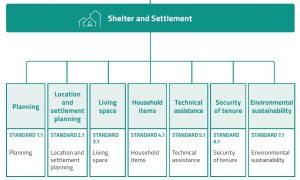Shelter and Settlement Responses Aim to Provide a Safe Living Environment
Timely shelter and settlements support can save lives in the initial stages of a crisis. In addition to providing protection from weather, shelter is necessary to promote health, support family and community life, and provide dignity, security and access to livelihoods. Shelter is a fundamental human need. The sudden loss of a place to live due to a crisis is not just the loss of basic protection from the elements, it’s the loss of the “home”. The home provides conditions that restore self-worth, offer stability, contribute towards psychosocial well-being, improve health, security, offer access to essential services, provide a place to work and to raise a family. A home allows individuals and families to lead full lives both inside the home and as members of a community. To CRS, the provision of Shelter and settlement is an incremental process of assistance before, during and after a crisis, it should not be seen as a product.
For additional Shelter and Settlement support or questions please direct them to [email protected] or [email protected]
Sphere Standards 2018: Shelter and Settlement Chapter offers 7 standards accompanied with key actions and indicators and guidance which should be followed.

Please take some time to review this short video on CRS’ Shelter and Settlements approach
You can also view this video in Arabic, French or Spanish
How This Guide Should Be Used
To complement the guidance contained within the Sphere Standards, this electronic guide is intended as a practical resource for field practitioners to adapt and meet the quality standard of Shelter and Settlement assistance.
The guide is designed for online or offline access through CRS’ EFOM. Where possible, the guide draws from both CRS resources and external sources.
Contents
I. Project Design
1. Assessments
1.1 Preparation
1.2 Rapid Needs Assessment
1.3 Shelter Option Feasibility Assessment
1.4 Detailed Needs Assessment
2. Planning / Project Design
2.1 Strategy
2.2 Assistance options
2.3 Implementation options
2.4 Assistance and Implementation Options – Case Studies
2.5 Staff Planning
II. Project Implementation Coming Soon
III. Shelter & Settlements Monitoring, Evaluation, Accountability, and Learning, (MEAL) Coming Soon
Will includes guidelines on constructing a theory of change, example indicators for shelter outputs, donor operating manuals, and a case study MEAL report.
IV. Shelter and Settlements Protection Mainstreaming
Includes the shelter cluster thorough protection checklist for implementing shelter activities with protection concerns in mind, a French training on protection in shelter, and links to online platform.
V. Key Documents and Other Materials
This section provides links to some overarching shelter and settlements technical references and guidance documents, please also feel free to contact the Humanitarian Response Department Shelter and Settlements team with questions or requests for support